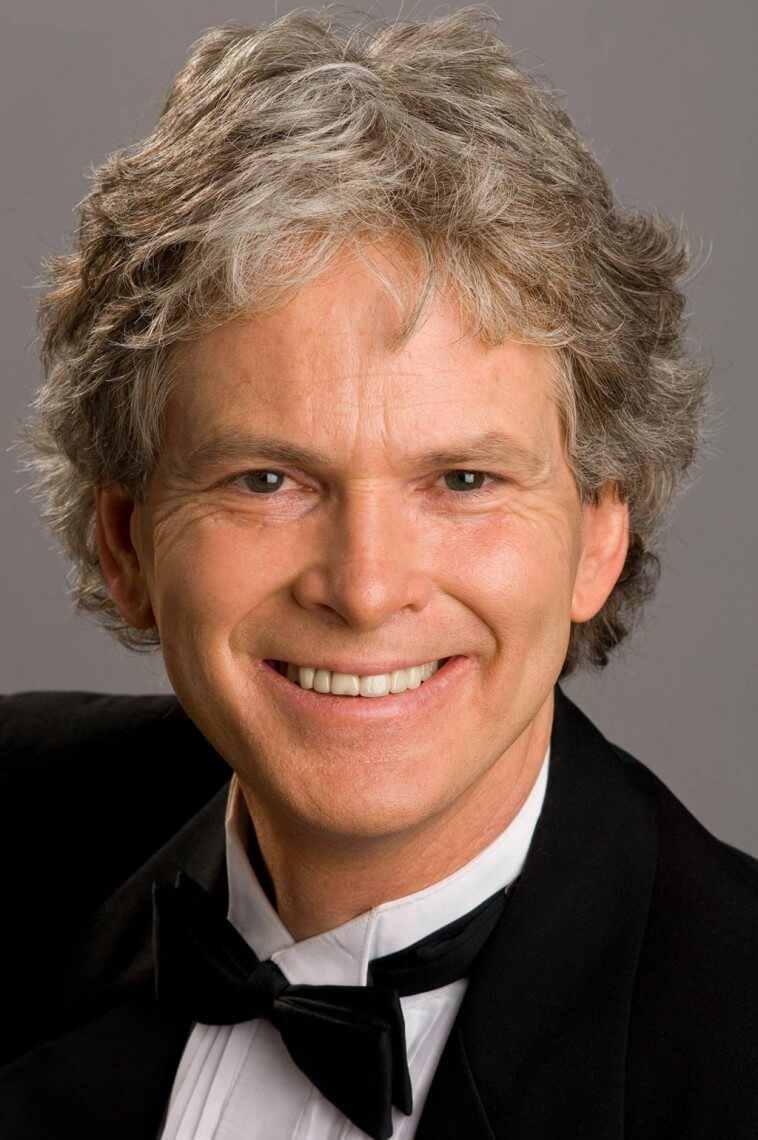The multi-talented Westben Artistic Director reveals what makes him tick.

We seem to be in the midst of a Canadian operatic renaissance of sorts. No, I’m not talking about yet another production of warhorses like Tosca or La boheme. I’m referring to the astonishing burst of new creations, composed, produced and performed by Canadian talent, in venues large and small. These contemporary works amply demonstrate that opera as an art form is alive and well in Canada. One such creation, The Pencil Salesman, will receive its world premiere on June 25, at the Westben Arts Festival. This summer festival is located in picturesque Campbellford, a comfortable drive east of Toronto. Since 1999, composer-pianist Brian Finley and his wife, soprano Donna Bennett, have created a vibrant program of classical music in this part of our province, attracting audiences near and far.
The Pencil Salesman, Finley’s newest creation, will be the centrepiece for voice fans at the Festival. It features a strong cast, led by veteran Canadian baritone John Fanning in the central role of Boris Ball, the inventor. Joining him are well-known singers the likes of Donna Bennett, Virginia Hatfield, Keith Klassen and Alexander Dobson. Creating a new work on the scale of an opera is always a major undertaking. Baritone John Fanning, an opera veteran with a 30+ years career including 10 at the Met, is looking forward to bringing the character of Boris Ball to life: “It’s always a pleasure to create a role. There are no preconceived notions of how it should go. It’s a clean slate and the creative team gets a chance to build it together. And it’s great to have the composer as part of the team. Brian is a great colleague, a wonderful and passionate musician, and he also has a very fun sense of music-making.”
I sat down with composer-pianist Brian Finley for a chat about his new creation. Congenial, articulate, and very smart — our conversation had an uncommon ease and a natural flow. What was meant to be a relatively brief interview turned into a 90-minute, wide-ranging conversation about the opera, but also about his vision surrounding art and creativity. I was curious as to why he chose the operatic genre, given its inherent and rather daunting challenges for a small summer festival. I think I surprised him with my first question, which I posed to him teasingly:
JS: You wear many hats – you are a pianist, a composer, and a librettist. And as artistic and managing director of Westben, you are also an arts administrator and impresario. Is there anything you don’t do?
BF: (Laughs) The dishes!!! (More big hearty laughs before turning serious) No, I’m also a husband; and a father of two boys, Ben and Adam. And I’m an accompanist – I accompany my wife, Donna, who’s a soprano. I get a special satisfaction when I hear her sing my music.
JS: I was just teasing you…Tell us about your latest creation, The Pencil Salesman. How did this opera come about?
BF: The idea came to me seven years ago, when I was having lunch with a good friend, Dr Agnes Herzberg, Professor Emeritus of Statistics at Queens University. She was expressing her frustration with the ever changing technology in her work. As someone who still uses a fountain pen and writes letters, Dr Herzberg is befuddled by the technology in modern life.
JS: As a retired academic myself, I think I understand where she’s coming from! In academia, we’re always faced with increasingly complex technology in order to do our work, to teach, to do research. It’s always a bit of a struggle to keep up with it. And as I get older, I do find that it gets harder…
BF: She was telling me about her frustration with modern technology, but what I found even more interesting is the breakdown of human communications as a result of the preoccupation with technology – that’s the bigger issue. All the effort to communicate ends up alienating us more than communicating. My father used to send me newspaper clippings, and insisted on face to face. Now, take my sons for example – I Skype with one son, and text with the other. That has become the more interesting story, the difficulty of people connecting with each other. I thought – there’s an opera in this! Dr. Herzberg is commissioning the piece.
JS: About using technology like email instead of face to face – we do sometimes use it to avoid actual conversations…
BF: Emails give you time to think about it, and you can change it (before sending). It’s a much different experience. Modern communication technology allows us to maintain our singularity. We are autonomous, communicating at our will. Instead of bringing us together, it’s actually separating us.
JS: How do you turn that germ of an idea into an opera?
BF: On the theme of human connectedness, I’ve created a family, a family of inventors. The father (Boris Ball) created a special typewriter years ago. He is so set on his technology that he thinks you can’t outdo it, that’s the best it can get. His son comes forward with a specialized computer keyboard, and the two just don’t meet. Boris takes himself further and further into the past. He doesn’t understand how the rest of the world can’t see things his way. He misses completely the third generation, his son’s daughter. He’s completely segregated from her. Her only friend is a handheld device; she’s completely bound by it. Her grandfather doesn’t even know her. So this poor pencil salesman, the seller of simplicity, is the guy who stumbles into the story and brings the grandfather and granddaughter together – by the simple act of communicating. It’s also a very funny story. The image of the pencil, as a piece of technology, is so simple. Yet it’s also complex – we start things, the germs of ideas, with a pencil.
JS: That’s a very interesting story — I’m willing to bet it’ll resonate with many in your audience, especially the older people! As I’m hearing you speak about this, I do have one question. If indeed Boris is an inventor, it seems to me he’s someone who is used to thinking “outside the box.” Then why is he not more open to change? That strikes me as a bit of a contradiction…
BF: That’s perceptive of you. It’s been raised. I think Boris remembers a time when he’s completely fulfilled and famous. Since then his inventiveness has gone to sleep; it has fallen into another place in his system. The pencil salesman helps to reawaken the inventiveness in Boris. The end of the piece has him moving on, from his typewriter and his past, into new things and new ideas. New things from the granddaughter whom he never knew before. His curiosity of life has reawaken.
JS: Very intriguing. I have friends and former colleagues at the university who are very resistant to technology. My gut feeling is that they may have a deep-seated fear that they may not be able to master the technology.
BF: Or some people, who object “On Principle.” The generational aspect of this is interesting. Where I have problems with technology is the constant changes. I have so many other things I want to do, but I don’t want to spend my time figuring out how to work the technology. On the other hand, as I’m preparing a full orchestral score, I’m so glad to have the technology!
JS: Do you do your own orchestration? How big is the orchestra?
BF: Yes, I do, and it’s an overwhelming job! There’ll be 20 musicians, so it’s a chamber orchestra. It’s designed after a Mozart piano concerto. Dr. Herzberg wanted it to be a Mozartian opera. My first thought was – can’t it be a Finley opera? But the more I thought about it, the more I’m drawn to the deep simplicity of Mozart, its beautiful, classical perfection that goes infinitely deep. The Mozart style keeps coming back in this piece. It strays away and then comes back in a series of vignettes right through the work.
JS: Is it’s structured like a typical opera?
BF: It’s a classically built piece, in sonata form. There are two acts – the first act is big, with four scenes; the second act has three scenes. In between are vignettes that go through the whole gamut of technological communications, from Neanderthals right through to a seniors’ home where the residents are trying to use the latest technology. The stories are far from the (central plot of the) opera, but it gets closer and closer. The last vignette involves the opera’s main characters.
JS: Are you going to have arias, duets and ensembles?
BF: Yes, but it’s fairly conversational – it comes in and out, and then a character takes over and sings what’s essentially an aria…
JS: Tell me, what’s your musical language?
BF: That’s a difficult question. I’m all over the map. I’m a tonal composer. I do love classical harmony, but I also love the energy of Bernstein. I’m not an aggressively bizarre composer, but I’m colourful.
JS: Do you believe in melodies? I ask because so many contemporary composers seem to shy away from any sort of melodic signature in their music.
BF: Absolutely! I am proud to be known (as a melodist), I’m complimented for my melodies.
JS: You mentioned in the publicity material that this is a sort of opera-musical. My instinct tells me The Pencil Salesman is a bit of a crossover piece. Is that fair to say?
BF: You know, it’s hard to put a label on this piece. For me it’s a subject that goes very deep, one that has many layers. I think of myself as an emotional composer. My love of melody, of harmony, of feelings – that’s what I’m after. The reason for creating an opera, for composing music, is to go deeper than words, to amplify it.
JS: So much of contemporary classical music is the opposite of emotional…the pieces tend to be intellectual.
BF: Yes, you can do that intellectually but it’s so much more rewarding to tap into the emotions. I’m also a funny composer…there’s a lot of humour in this opera.
JS: Let me ask you an uncomfortable question. Given that you aim for an emotional and melodic musical idiom, and a classical, Mozartian structure – are you afraid of being labeled as unoriginal, of being derivative?
BF: [Pause] I’m not that worried about it. It’s more important for me to move people, to reach an audience emotionally. If they are moved, it makes up for it.
JS: Thank you for being so honest with me. I’ll be at the opening and I’m prepared to be moved.

The Pencil Salesman opens on June 25 for 5 performances, to July 3. For more information, go to http://www.westben.ca/pencil-salesman
#LUDWIGVAN
Want more updates on Toronto-centric classical music news and review before anyone else finds out? Get our exclusive newsletter here and follow us on Facebook for all the latest.
- SCRUTINY | Opera Atelier’s All Is Love Makes Triumphal Return - April 15, 2024
- SCRUTINY | From The Heart: Ema Nikolovska And Charles Richard-Hamelin Offer Unique Program At Koerner Hall - March 26, 2024
- SCRUTINY | The Glenn Gould School Spring Opera Presents A Superb Dialogues Des Carmélites - March 22, 2024



